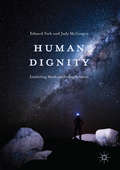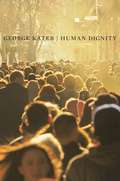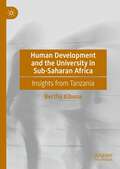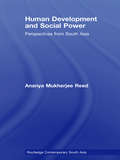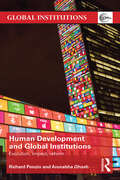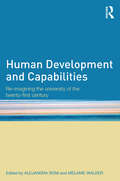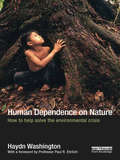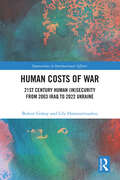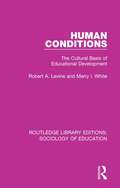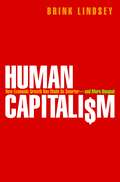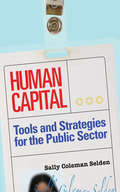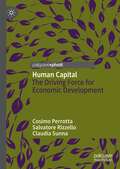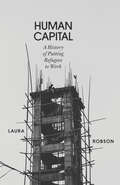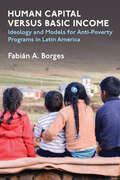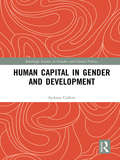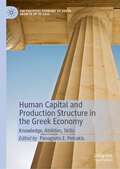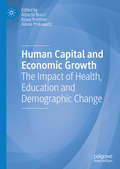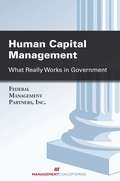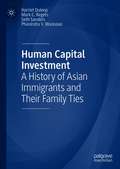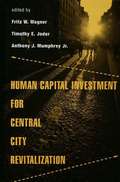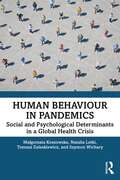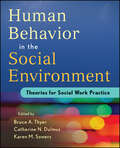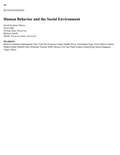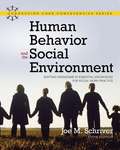- Table View
- List View
Human Dignity
by Edward Sieh Judy McgregorThis book examines the concept of dignity from a variety of global perspectives. It scrutinizes how dignity informs policy and practice, and is influenced by international and domestic law, human rights values, and domestic politics. An exciting collection of essays, this edited volume provides an analysis of human rights as they are experienced by real people who have in many cases been forced to take action to further their own interests. Readers will discover an extensive range of issues discussed, from the internet, climate change and disabilities, to globalization, old-age, and migrants' rights. The last section deals with the impact of various issues on indigenous and migrant populations, specifically violence in Columbia, border issues in Tijuana, women's and children's rights violations, and the complex problems experienced by refugees, particularly in regards to citizenship. The interdisciplinary nature of this work makes it an invaluable read for scholars of Health Studies, Law, Human Rights, Sociology and Politics.
Human Dignity
by George KatebWe often speak of the dignity owed to a person. And dignity is a word that regularly appears in political speeches. Charters are promulgated in its name, and appeals to it are made when people all over the world struggle to achieve their rights. But what exactly is dignity? When one person physically assaults another, we feel the wrong demands immediate condemnation and legal sanction. Whereas when one person humiliates or thoughtlessly makes use of another, we recognize the wrong and hope for a remedy, but the social response is less clear. The injury itself may be hard to quantify. Given our concern with human dignity, it is odd that it has received comparatively little scrutiny. Here, George Kateb asks what human dignity is and why it matters for the claim to rights. He proposes that dignity is an “existential” value that pertains to the identity of a person as a human being. To injure or even to try to efface someone’s dignity is to treat that person as not human or less than human—as a thing or instrument or subhuman creature. Kateb does not limit the notion of dignity to individuals but extends it to the human species. The dignity of the human species rests on our uniqueness among all other species. In the book’s concluding section, he argues that despite the ravages we have inflicted on it, nature would be worse off without humanity. The supremely fitting task of humanity can be seen as a “stewardship” of nature. This secular defense of human dignity—the first book-length attempt of its kind—crowns the career of a distinguished political thinker.
Human Development and the University in Sub-Saharan Africa: Insights from Tanzania
by Bertha KibonaThis book utilises a human development and capability approach to examine the role of higher education in the context of Tanzania. The author considers decolonisation debates as they relate to African concerns in order to make a case for systems design and implementation implications for decolonising higher education institutions. The book will be of interest to students, scholars and policymakers in the field of higher education.
Human Development and Social Power: Perspectives from South Asia (Routledge Contemporary South Asia Ser.)
by Ananya Mukherjee ReedIn South Asia and beyond, human development continues to be in a state of crisis. Each successive Human Development Report (HDR) and the pervasive global failure to achieve the Millennium Development Goals are constant reminders of this crisis. An equally, and even more distressing dimension of human development is its great unevenness. Even in cou
Human Development and Global Institutions: Evolution, Impact, Reform (Global Institutions)
by Arunabha Ghosh Richard PonzioThis book provides a timely and accessible introduction to the foundational ideas associated with the human development school of thought. It examines its conceptual evolution during the post-colonial era, and discusses how various institutions of the UN system have tried to engage with this issue, both in terms of intellectual and technical advance, and operationally. Showing that human development has had a profound impact on shaping the policy agenda and programming priorities of global institutions, it argues that human development has helped to preserve the continued vitality of major multilateral development programs, funds, and agencies. It also details how human development faces new risks and threats, caused by political, economic, social, and environmental forces which are highlighted in a series of engaging case studies on trade, water, energy, the environment, democracy, human rights, and peacebuilding. The book also makes the case for why human development remains relevant in an increasingly globalized world, while asking whether global institutions will be able to sustain political and moral support from their member states and powerful non-state actors. It argues that fresh new perspectives on human development are now urgently needed to fill critical gaps across borders and entire regions. A positive, forward-looking agenda for the future of global governance would have to engage with new issues such as the Sustainable Development Goals, energy transitions, resource scarcity, and expansion of democratic governance within and between nations. Redefining the overall nature and specific characteristics of what constitutes human progress in an increasingly integrated and interdependent world, this book serves as a primer for scholars and graduate students of international relations and development. It is also relevant to scholars of economics, political science, history, sociology, and women’s studies.
Human Development and Capabilities: Re-imagining the university of the twenty-first century (Education, Poverty And International Development Ser.)
by Melanie Walker Alejandra BoniGlobally, universities are the subject of public debate and disagreement about their private benefits or public good, and the key policy vehicle for driving human capital development for competitive knowledge economies. Yet what is increasingly lost in the disagreements about who should pay for university education is a more expansive imaginary which risks being lost in reductionist contemporary education policy. This is compounded by the influences on practices of students as consumers, of a university education as a private benefit and not a public good, of human capital outcomes over other graduate qualities, and of unfettered markets in education. Policy reductionism comes from a narrow vision of the activities, products, and objectives of the University and a blinkered vision of what is a knowledge society. Human Development and Capabilities, therefore, imaginatively applies a theoretical framework to universities as institutions and social practices from human development and the capability approach, attempting to show how universities might advance equalities rather than necessarily widen them, and how they can contribute to a sustainable and democratic society. Picking through the capability approach for human development, in relation to Universities, this book highlights and explores three main ideas: theoretical insights to advance thinking about human development and higher education Policy implications for the responsibilities and potential contributions of universities in a period of significant global change Operationalising a New Imaginary This fresh take on the work and purpose of the University is essential reading for anyone interested in university education, capability approach and human development; particularly postgraduates, University policy makers, researchers and academics in the field of higher education.
Human Dependence on Nature: How to Help Solve the Environmental Crisis
by Haydn WashingtonHumanity is dependent on Nature to survive, yet our society largely acts as if this is not the case. The energy that powers our very cells, the nutrients that make up our bodies, the ecosystem services that clean our water and air; these are all provided by the Nature from which we have evolved and of which we are a part. This book examines why we deny or ignore this dependence and what we can do differently to help solve the environmental crisis. Written in an accessible and engaging style, Haydn Washington provides an excellent overview of humanity’s relationship with Nature. The book looks at energy flow, nutrient cycling, ecosystem services, ecosystem collapse as well as exploring our psychological and spiritual dependency on nature. It also examines anthropocentrism and denial as causes of our unwillingness to respect our inherent dependence on the natural environment. The book concludes by bringing these issues together and providing a framework for solutions to the environmental crisis.
Human Costs of War: 21st Century Human (In)Security from 2003 Iraq to 2022 Ukraine (Innovations in International Affairs)
by Bulent Gokay Lily HamourtziadouHuman Costs of War documents and analyses the direct and indirect toll that war takes on civilians and their livelihoods, taking a human security approach exploring personal, economic, political and community security in Afghanistan, Iraq and Ukraine, in the contexts of the War on Terror and the New Cold War.The book offers an understanding of war through the recording and comprehension of its civilian casualties and evaluates whether the force used has been proportionate to the threat that prompted it and the concern for human welfare. In the 21st century, the power of the USA has declined, while countries such as China and India become more powerful. The global power balance has been altered in a fundamental way towards a multi-polar world system, with the West no longer able to enforce its policies abroad. Regional and global governance are not assured, and devastating wars have taken a heavy toll in terms of death, poverty and displacement, which feed into the cycle of long-term insecurity. The authors argue that it is important for any conflict to be understood not only in terms of the perpetrators of violence, or of the political and economic reasons behind it, but also in terms of its impact on the civilian population and their security, focusing on conflicts in the Middle East which followed 9/11 and Russia’s invasion of Ukraine.The book will be of interest to academics, the public, the media, security agencies and international organisations. It will be useful for undergraduate and postgraduate students of International Relations, International Law, Security, Politics, Policing, Human Rights, Ethics, Peace Studies, Eastern Europe, American Studies and the Middle East.
Human Conditions: The Cultural Basis of Educational Developments (Routledge Library Editions: Sociology of Education #32)
by Merry I. White Robert A LevineFirst published in 1986, this book proposes and illustrates a new approach to the comparative analysis of educational policy, based on anthropological and historical inquiry. It reviews the transitions of Western countries, Japan, and the People’s Republic of China and in doing so investigates cultural ideas of human potential and how they inform social and economic goals of education. An analysis of the problems and emerging patterns in developing countries reveals how and why the meanings of life for the majority of their populations were still influenced by agrarian cultural models, even after the introduction of new educational and occupational careers. In place of universalistic economic models and homogenous modernization strategies, the authors propose that culture-specific meanings of education are determined by each country’s particular transition from its agrarian past to its socio-economic conditions at the time. They argue that change in educational development has been as varied in ends, means and significance outcomes as the cultures in which it has occurred and point to the need for a deeper understanding of cultural contexts in which policy choices and development plans are made.
Human Capitalism: How Economic Growth Has Made Us Smarter--and More Unequal
by Brink LindseyWhy the rich are getting smarter while the poor are being left behindWhat explains the growing class divide between the well educated and everybody else? Noted author Brink Lindsey, a senior scholar at the Kauffman Foundation, argues that it's because economic expansion is creating an increasingly complex world in which only a minority with the right knowledge and skills—the right "human capital"—reap the majority of the economic rewards. The complexity of today's economy is not only making these lucky elites richer—it is also making them smarter. As the economy makes ever-greater demands on their minds, the successful are making ever-greater investments in education and other ways of increasing their human capital, expanding their cognitive skills and leading them to still higher levels of success. But unfortunately, even as the rich are securely riding this virtuous cycle, the poor are trapped in a vicious one, as a lack of human capital leads to family breakdown, unemployment, dysfunction, and further erosion of knowledge and skills. In this brief, clear, and forthright eBook original, Lindsey shows how economic growth is creating unprecedented levels of human capital—and suggests how the huge benefits of this development can be spread beyond those who are already enjoying its rewards.
Human Capital: Tools and Strategies for the Public Sector
by Sally Coleman SeldenTake a sneak peak inside!Click on the link below to preview chapter one. Order your exam copy today by clicking on the "Request an Exam Copy" link above.Chapter 1With the shift from “human resources” to “human capital management” (HCM), public agencies are striving to strategically manage their workforces. Sally Selden’s groundbreaking book moves far beyond describing best practices and offers the context in which innovative practices have been implemented. She details how agencies are creating performance-aligned workforces by adopting systems and policies that are driven by their strategic missions.This book covers core topics of personnel courses—including hiring, training, retention, performance, and recognition—but also includes integrated coverage on measuring success through assessment. Further helping readers grasp how HCM works, the book uses original data from the Government Performance Project and incorporates many comparative examples across a wide range of states, plus federal and municipal agencies. Unlike anything else available, Human Capital fills a critical gap for both students and public personnel professionals.
Human Capital: The Driving Force for Economic Development
by Cosimo Perrotta Claudia Sunna Salvatore RizzelloThis book presents a new interpretation of the role of human capital and the state in driving economic development. It places these ideas within broader debates within the history of economic thought to highlight how the nature of economic activity is a collective and coordinated process. Through examining how the welfare state reversed traditional accumulation by relying on human capital growth, the importance of the state within the development process is emphasised, alongside the multifaceted nature of competition. Different forms of public expenditure are then evaluated to identify the most productive forms of public spending and the drivers of long term economic development.This book questions the relationship between profits and rent and proposes a new kind of economic development based around human capital. It will be relevant to students and researchers interested in the history of economic thought, the political economy, and labour economics.
Human Capital: A History of Putting Refugees to Work
by Laura RobsonHOW GLOBAL HUMANITARIANISM TURNS REFUGEES INTO CHEAP LABORHistorian Laura Robson unveils the dark heart of our purportedly humanitarian international regime. Tracing the century-long history of attempts to remake refugees into disposable migrant labor, Robson elucidates global humanitarianism&’s deep-seated commitment to refugee exploitation and containment.Surveying more than a hundred years of policy across the globe, Robson captures the travails of Balkan refugees in the late Ottoman Empire, Roosevelt&’s secret plans to use German Jewish refugees as laborers in Latin America, and contemporary European efforts to deploy Syrians as low-wage workers in remote regions of Jordan.The advent of internationalist refugee aid has long been told as an inspirational story in which reformers fought tirelessly for a system that would recognize and guarantee the rights of displaced and dispossessed people. But as Robson demonstrates, the motives behind modern refugee policy can be mercenary. Refugees have become easy prey for global industrial capitalism.
Human Capital versus Basic Income: Ideology and Models for Anti-Poverty Programs in Latin America
by Fabian A BorgesLatin America underwent two major transformations during the 2000s: the widespread election of left-leaning presidents (the so-called left turn) and the diffusion of conditional cash transfer programs (CCTs)—innovative social programs that award regular stipends to poor families on the condition that their children attend school. Combining cross-national quantitative research covering the entire region and in-depth case studies based on field research, Human Capital versus Basic Income: Ideology and Models for Anti-Poverty Programs in Latin America challenges the conventional wisdom that these two transformations were unrelated. In this book, author Fabián A. Borges demonstrates that this ideology greatly influenced both the adoption and design of CCTs. There were two distinct models of CCTs: a “human capital” model based on means-tested targeting and strict enforcement of program conditions, exemplified by the program launched by Mexico’s right, and a more universalistic “basic income” model with more permissive enforcement of conditionality, exemplified by Brazil’s program under Lula. These two models then spread across the region. Whereas right and center governments, with assistance from international financial institutions, enacted CCTs based on the human capital model, the left, with assistance from Brazil, enacted CCTs based on the basic income model. The existence of two distinct types of CCTs and their relation to ideology is supported by quantitative analyses covering the entire region and in-depth case studies based on field research in three countries. Left-wing governments operate CCTs that cover more people and spend more on those programs than their center or right-wing counterparts. Beyond coverage, a subsequent analysis of the 10 national programs adopted after Lula’s embrace of CCTs confirms that program design—evaluated in terms of scope of the target population, strictness of conditionality enforcement, and stipend structure—is shaped by government ideology. This finding is then fleshed out through case studies of the political processes that culminated in the adoption of basic income CCTs by left-wing governments in Argentina and Bolivia and a human capital CCT by a centrist president in Costa Rica.
Human Capital in Gender and Development: Feminist Political Economy And Empowerment (Routledge Studies in Gender and Global Politics)
by Sydney CalkinHuman Capital in Gender and Development addresses timely feminist debates about the relationship between feminism, neoliberalism, and international development. The book engages with human capital theory, a labour economics theory associated with the Chicago School that now animates a wide range of political and economic governance. The book argues that human capital theory has been instrumental in constructing an economistic vision of gender equality as a tool for economic growth, and girls and women of the global South as the quintessential entrepreneurs of the post-global financial crisis era. The book’s critique of human capital theory and its role in Gender and Development gives insights into the kinds of development interventions that typify the ‘Gender Equality as Smart Economics’ agenda of the World Bank and other international development institutions. From the World Bank, to NGOs, and private businesses, discourses about the economic benefits of gender equality and women’s empowerment underpin a range of development interventions that aim to unlock the ‘untapped’ potential of the world’s women. Its implications are both conceptual and material, producing more interventionist forms of development governance, increased power by private sector actors in development, and de-politicization of gender equality issues. Human Capital in Gender and Development will be of particular interest to feminist scholars in Politics, International Relations, Development Studies, and Human Geography. It will also be a useful resource for teaching key debates about feminism, neoliberalism, and international development.
Human Capital and Production Structure in the Greek Economy: Knowledge, Abilities, Skills (The Political Economy of Greek Growth up to 2030)
by Panagiotis E. PetrakisThe role of human capital has diversified considerably in the last 100 years. Today, the prevailing perception seeks a sustainable, integrated development which is based on the triptych of environment, economy, and society. In this mode of development, human capital has a positive effect on the economy, on social cohesion and optimal governance, as well as on the ecological footprint.This book studies the critical role of human capital in the Greek economy and its production structure. In doing so, this book analyzes the Greek labor market, employment, and structural changes, among other facets of this vibrant economy.
Human Capital and Economic Growth: The Impact of Health, Education and Demographic Change
by Alberto Bucci Klaus Prettner Alexia PrskawetzThis edited collection explores the links between human capital (both in the form of health and in the form of education), demographic change, and economic growth. Using empirical as well as theoretical perspectives, the authors investigate several important issues in the context of human capital, namely population ageing, inequality, public policy, and long-term economic development. Ultimately, they demonstrate that the accumulation of human capital is of crucial importance to long-run economic growth.
Human Capital Management: What Really Works in Government
by Federal Management Partners, Inc.Many federal agencies have made huge strides to develop, fully utilize, and enhance the effectiveness of their most valuable resource: their workforce. This book captures those successes and relates the stories behind them. Innovative recruitment and retention strategies, dynamic employee onboarding programs, leading-edge HR technology—these are some of the stories that offer valuable lessons for anyone dealing with human resources issues in government, business, or any other organizational environment. The authors highlight not only the successful outcomes of various agency programs, but also consider the bumps and hurdles encountered and overcome along the way. Rather than a theoretical presentation of what might, or should, work, Human Capital Management: What Really Works in Government provides thought-provoking and practical examples detailing what federal agencies are doing that is working.
Human Capital Investment: A History of Asian Immigrants and Their Family Ties
by Phanindra V. Wunnava Harriet Duleep Mark C. Regets Seth SandersIn 1965, a family-reunification policy for admitting immigrants to the United States replaced a system that chose immigrants based on their national origin. With this change, a 40-year hiatus in Asian immigration ended. Today, over three-quarters of US immigrants originate from Asia and Latin America. Two issues that dominate discussions of US immigration policy are the progress of post-reform immigrants and their contributions to the US economy. This book focuses on the earnings and human capital investment of Asian immigrants to the US after 1965. In addition, it provides a primer on studying immigrant economic assimilation, by explaining economists’ methodology to measure immigrant earnings growth and the challenges with this approach. The book also illustrates strategies to more fully use census data such as how to measure family income and how to use “panel data” that is embedded in the census. The book is a historical study as well as an extremely timely work from a policy angle. The passage of the 1965 Immigration and Nationality Act set the United States apart among economically developed countries due to the weight given to family unification. Based on analyses by economists—which suggest that the quality of immigrants to the US fell after the 1965 law—policymakers have called for fundamental changes in the US system to align it with the immigration systems of other countries. This book offers an alternative view point by proposing a richer model that incorporates investments in human capital by immigrants and their families. It challenges the conventional model in three ways: First, it views the decline in immigrants’ entry earnings after 1965 as due to investment in human capital, not to permanently lower “quality.” Second, it adds human capital investment and earnings growth after entry to the model. And finally, by taking investments by family members into account, it challenges the policy recommendation that immigrants should be selected for their occupational qualifications rather than family connections.
Human Capital Investment for Central City Revitalization (Contemporary Urban Affairs)
by Fritz W. Wagner Timothy E. Joder Anthony J. Mumphrey Jr.Viewing poverty as a condition that is fed and renewed on a daily basis by social and economic structures, this book focuses on the ways in which poor residents can be helped to improve their own situations, their living conditions, and the central city itself. Also includes four maps.
Human Beings in International Relations
by Jacobi, Daniel and Freyberg-Inan, Annette Daniel Jacobi Annette Freyberg-InanSince the 1980s, the discipline of International Relations has seen a series of disputes over its foundations. However, there has been one core concept that, although addressed in various guises, had never been explicitly and systematically engaged with in these debates: the human. This volume is the first to address comprehensively the topic of the human in world politics. It comprises cutting-edge accounts by leading scholars of how the human is (or is not) theorized across the entire range of IR theories, old and new. The authors provide a solid foundation for future debates about how, why, and to which ends the human has been or must (not) be built into our theories, and systematically lay out the implications of such moves for how we come to see world politics and humanity's role within it.
Human Behaviour in Pandemics: Social and Psychological Determinants in a Global Health Crisis
by Malgorzata Kossowska Tomasz Zaleskiewicz Natalia Letki Szymon WicharyThis timely interdisciplinary book brings together a wide spectrum of theoretical concepts and their empirical applications in relation to the COVID-19 pandemic, informing our understanding of the social and psychological bases of a global crisis. Written by an author team of psychologists and sociologists, the volume provides comprehensive coverage of phenomena such as fear, risk, judgement and decision making, threat and uncertainty, group identity and cohesion, social and institutional trust, and communication in the context of an international health emergency.The topics have been grouped into four main chapters, focusing on the individual, group, social, and communication perspectives of the issues affecting or being affected by the pandemic, based on over 740 classic and current references of peer-reviewed research and contextualized with an epidemiological perspective discussed in the introduction. The volume finishes with two special sections, with a chapter on cultural specificity of the social impact of pandemics, focusing specifically on both Islam and Hinduism, and a chapter on the cross-national differences in policy responses to the current health crisis. Providing not just a reference for academic research, but also short-term and long-term policy solutions based on successful strategies to combat adverse social, cognitive, and emotional consequences, this is the ideal resource for academics and policymakers interested in social and psychological determinants of individual reactions to pandemics, as well as in fields such as economics, management, politics, and medical care.
Human Behavior in the Social Environment
by Bruce A. Thyer Karen M. Sowers Catherine N. DulmusAn accessible and engaging guide to the study of human behavior in the social environment, covering every major theoretical approachProviding an overview of the major human behavioral theories used to guide social work practice with individuals, families, small groups, and organizations, Human Behavior in the Social Environment examines a different theoretical approach in each chapter-from its historical and conceptual origins to its relevance to social work and clinical applications.Each chapter draws on a theoretical approach to foster understanding of normative individual human development and the etiology of dysfunctional behavior, as well as to provide guidance in the application of social work intervention.Edited by a team of scholars, Human Behavior in the Social Environment addresses the Council on Social Work Education's required competencies for accreditation (EPAS) and explores:Respondent Learning theoryOperant Learning theoryCognitive-Behavioral theoryAttachment theoryPsychosocial theoryPerson-Centered theoryGenetic theoryEcosystems theorySmall Group theoryFamily Systems theoryOrganizational theory
Human Behavior and the Social Environment: Social Systems Theory
by Rebecca Smith Orren DaleHuman Behavior and the Social Environment: Social Systems Theory provides an expanded treatment of systems theory, and applies the theory to common social work concerns. The text links systems to social roles, and provides a framework for critical assessment of the theories from the systems/roles perspective. It assesses the strengths and weaknesses of each theory with regard to the value of each theory for social work practice. <P><P> Social systems theory remains the focus of this text. In addition theories are identified as grand theories, middle range theories, or focal theories, to assist the student in understanding the scope and application of theories across system sizes. This text breaks new ground in using role theory as a middle range theory to address common features of human systems at a level that is more intuitive for students, and yet detailed enough to stimulate independent thinking. The text addresses the standard repertoire of theories, and in addition presents application of the theories to social issues such as violence and addiction.
Human Behavior and the Social Environment: Shifting Paradigms in Essential Knowledge for Social Work Practice (5th edition)
by Joe M. SchriverThis textbook offers a comparative examination of competing paradigms in the study of human behavior and the social environment. The text focuses at each system level on the need for multiple perspectives that respect the diversity of persons and environments with whom social workers interact.
